grc-dor, Ἀπέλλων, Apéllōn, ; grc, Ἀπείλων, Apeílōn, label=
la, Apollō, la, Apollinis, label=genitive, , ; , is one of the
Etymology
Apollo (Greco-Roman epithets
Apollo's chief epithet was Phoebus ( ; , ''Phoibos'' ), literally "bright". It was very commonly used by both the Greeks and Romans for Apollo's role as the god of light. Like other Greek deities, he had a number of others applied to him, reflecting the variety of roles, duties, and aspects ascribed to the god. However, while Apollo has a great number of appellations in Greek myth, only a few occur inSun
*Aegletes ( ; Αἰγλήτης, ''Aiglētēs''), from , "light of the sun" *Helius ( ; , '' Helios''), literally "sun" *Wolf
*Lycegenes ( ; , ''Lukēgenēs''), literally "born of a wolf" or "born of Lycia" *Lycoctonus ( ; , ''Lykoktonos''), from , "wolf", and , "to kill"Origin and birth
Apollo's birthplace was Mount Cynthus on the island of Delos. *Cynthius ( ; , ''Kunthios''), literally "Cynthian" *Cynthogenes ( ; , ''Kynthogenēs''), literally "born of Cynthus" *Delius ( ; Δήλιος, ''Delios''), literally "Delian" *Didymaeus ( ; , ''Didymaios'') from δίδυμος, "twin", as the twin ofPlace of worship
Delphi and

Healing and disease
*Acesius ( ; , ''Akesios''), from , "healing". Acesius was the epithet of Apollo worshipped inFounder and protector
* Agyieus ( ; , ''Aguīeus''), from , "street", for his role in protecting roads and homes *Prophecy and truth
*Coelispex (Roman) ( ), from Latin ''coelum'', "sky", and ''specere'' "to look at" *Iatromantis ( ; , ''Iātromantis'',) from , "physician", and , "prophet", referring to his role as a god both of healing and of prophecy *Leschenorius ( ; , ''Leskhēnorios''), from , "converser" *Loxias ( ; , ''Loxias''), from , "to say", historically associated with , "ambiguous" *Manticus ( ; , ''Mantikos''), literally "prophetic" *Proopsios (), meaning "foreseer" or "first seen"Music and arts
*Musagetes ( ;Archery
*Aphetor ( ; , ''Aphētōr''), from , "to let loose" *Aphetorus ( ; , ''Aphētoros''), as the preceding *Arcitenens (Roman) ( ), literally "bow-carrying" *Argyrotoxus ( ; , ''Argyrotoxos''), literally "with silver bow" *Clytotoxus ( ; , ''Klytótoxos''), "he who is famous for his bow", the renowned archer. *Hecaërgus ( ; , ''Hekaergos''), literally "far-shooting" *Hecebolus ( ; , ''Hekēbolos''), "far-shooting" *Ismenius ( ; , ''Ismēnios''), literally "of Ismenus", after Ismenus, the son ofAppearance
* Acersecomes (, ''Akersekómēs''), "he who has unshorn hair", the eternal ephebe. * Chrysocomes ( ; , ''Khrusokómēs''), literally "he who has golden hair."Amazons
* Amazonius (),Other
*Patroos (Πατρώος, ancestral), there is theCeltic epithets and cult titles
Apollo was worshipped throughout theOrigins
 The cult centers of Apollo in Greece, Delphi and Delos, date from the 8th century BCE. The Delos sanctuary was primarily dedicated to
The cult centers of Apollo in Greece, Delphi and Delos, date from the 8th century BCE. The Delos sanctuary was primarily dedicated to Healer and god-protector from evil
 In classical times, his major function in popular religion was to keep away evil, and he was therefore called "apotropaios" (, "averting evil") and "alexikakos" ( "keeping off ill"; from v. + n. ). Apollo also had many epithets relating to his function as a healer. Some commonly-used examples are "paion" ( literally "healer" or "helper") "epikourios" (, "succouring"), "oulios" (, "healer, baleful") and "loimios" (, "of the plague"). In later writers, the word, "paion", usually spelled "Paean", becomes a mere epithet of Apollo in his capacity as a god of healing.
Apollo in his aspect of "healer" has a connection to the primitive god Paean (), who did not have a cult of his own. Paean serves as the healer of the gods in the '' Iliad'', and seems to have originated in a pre-Greek religion. It is suggested, though unconfirmed, that he is connected to the Mycenaean figure ''pa-ja-wo-ne'' (Linear B: ). At Google Books. Paean was the personification of holy songs sung by "seer-doctors" (), which were supposed to cure disease.
Homer illustrated Paeon the god and the song both of
In classical times, his major function in popular religion was to keep away evil, and he was therefore called "apotropaios" (, "averting evil") and "alexikakos" ( "keeping off ill"; from v. + n. ). Apollo also had many epithets relating to his function as a healer. Some commonly-used examples are "paion" ( literally "healer" or "helper") "epikourios" (, "succouring"), "oulios" (, "healer, baleful") and "loimios" (, "of the plague"). In later writers, the word, "paion", usually spelled "Paean", becomes a mere epithet of Apollo in his capacity as a god of healing.
Apollo in his aspect of "healer" has a connection to the primitive god Paean (), who did not have a cult of his own. Paean serves as the healer of the gods in the '' Iliad'', and seems to have originated in a pre-Greek religion. It is suggested, though unconfirmed, that he is connected to the Mycenaean figure ''pa-ja-wo-ne'' (Linear B: ). At Google Books. Paean was the personification of holy songs sung by "seer-doctors" (), which were supposed to cure disease.
Homer illustrated Paeon the god and the song both of Dorian origin
The '' Homeric Hymn to Apollo'' depicts Apollo as an intruder from the north. The connection with the northern-dwellingMinoan origin
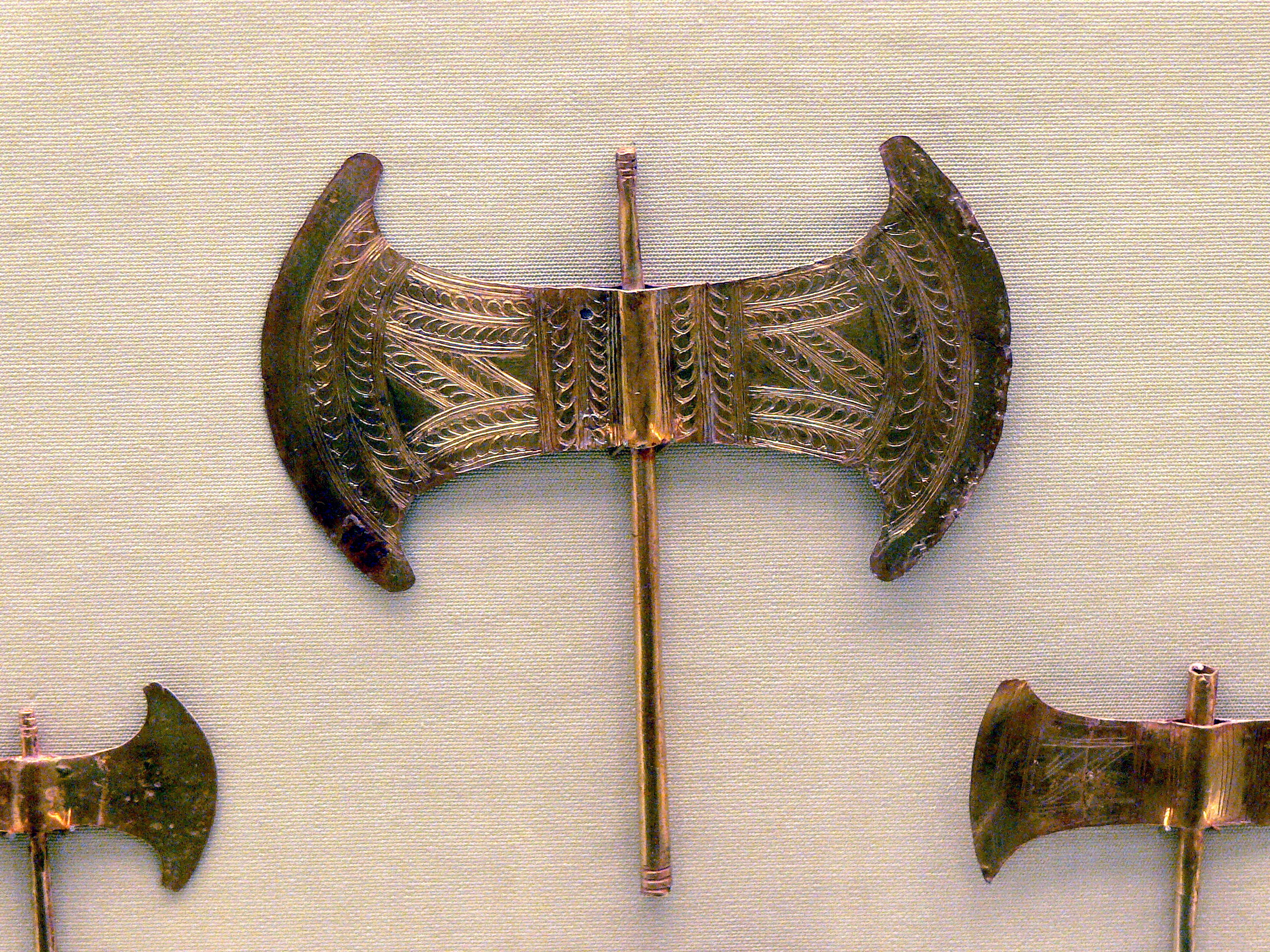 George Huxley regarded the identification of Apollo with the Minoan deity Paiawon, worshipped in Crete, to have originated at Delphi. In the ''Homeric Hymn'', Apollo appeared as a dolphin and carried Cretan priests to Delphi, where they evidently transferred their religious practices. ''Apollo Delphinios'' or ''Delphidios'' was a sea-god especially worshipped in Crete and in the islands. Apollo's sister
George Huxley regarded the identification of Apollo with the Minoan deity Paiawon, worshipped in Crete, to have originated at Delphi. In the ''Homeric Hymn'', Apollo appeared as a dolphin and carried Cretan priests to Delphi, where they evidently transferred their religious practices. ''Apollo Delphinios'' or ''Delphidios'' was a sea-god especially worshipped in Crete and in the islands. Apollo's sister Anatolian origin
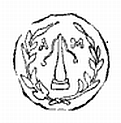 A non-Greek origin of Apollo has long been assumed in scholarship. The name of Apollo's mother Leto has Lydian origin, and she was worshipped on the coasts of
A non-Greek origin of Apollo has long been assumed in scholarship. The name of Apollo's mother Leto has Lydian origin, and she was worshipped on the coasts of Proto-Indo-European
TheOracular cult

 Unusually among the Olympic deities, Apollo had two cult sites that had widespread influence: Delos and Delphi. In cult practice, Delian Apollo and
Unusually among the Olympic deities, Apollo had two cult sites that had widespread influence: Delos and Delphi. In cult practice, Delian Apollo and Oracular shrines
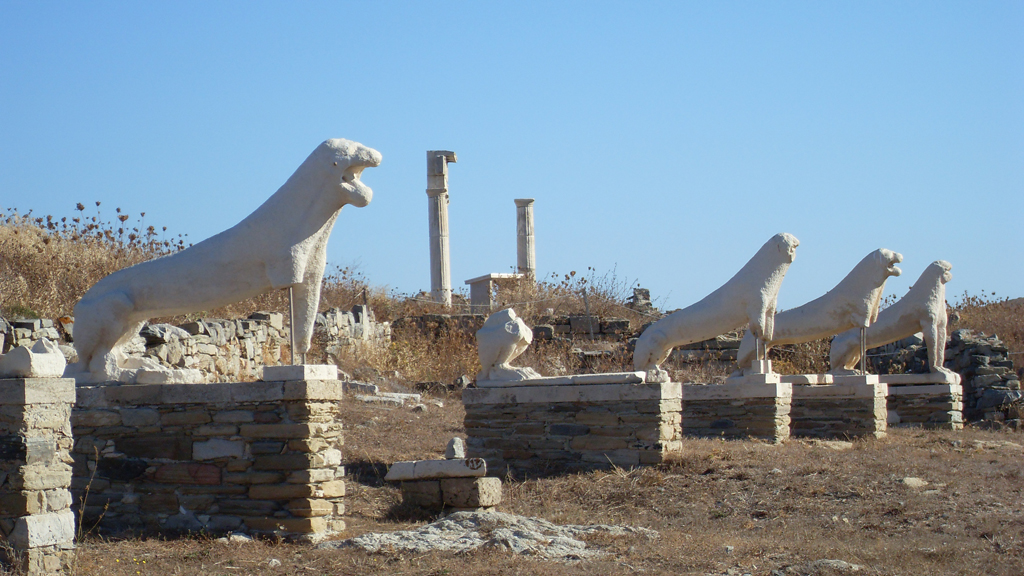 Apollo had a famous oracle in Delphi, and other notable ones in
Apollo had a famous oracle in Delphi, and other notable ones in Temples of Apollo
Many temples were dedicated to Apollo in Greece and the Greek colonies. They show the spread of the cult of Apollo and the evolution of the Greek architecture, which was mostly based on the rightness of form and on mathematical relations. Some of the earliest temples, especially inGreek temples
* Thebes, Greece: The oldest temple probably dedicated to ''Apollo Ismenius'' was built in the 9th century B.C. It seems that it was a curvilinear building. The * Corinth: A
* Corinth: A  * Syracuse, Sicily: A
* Syracuse, Sicily: A , World Heritage Site. containing a
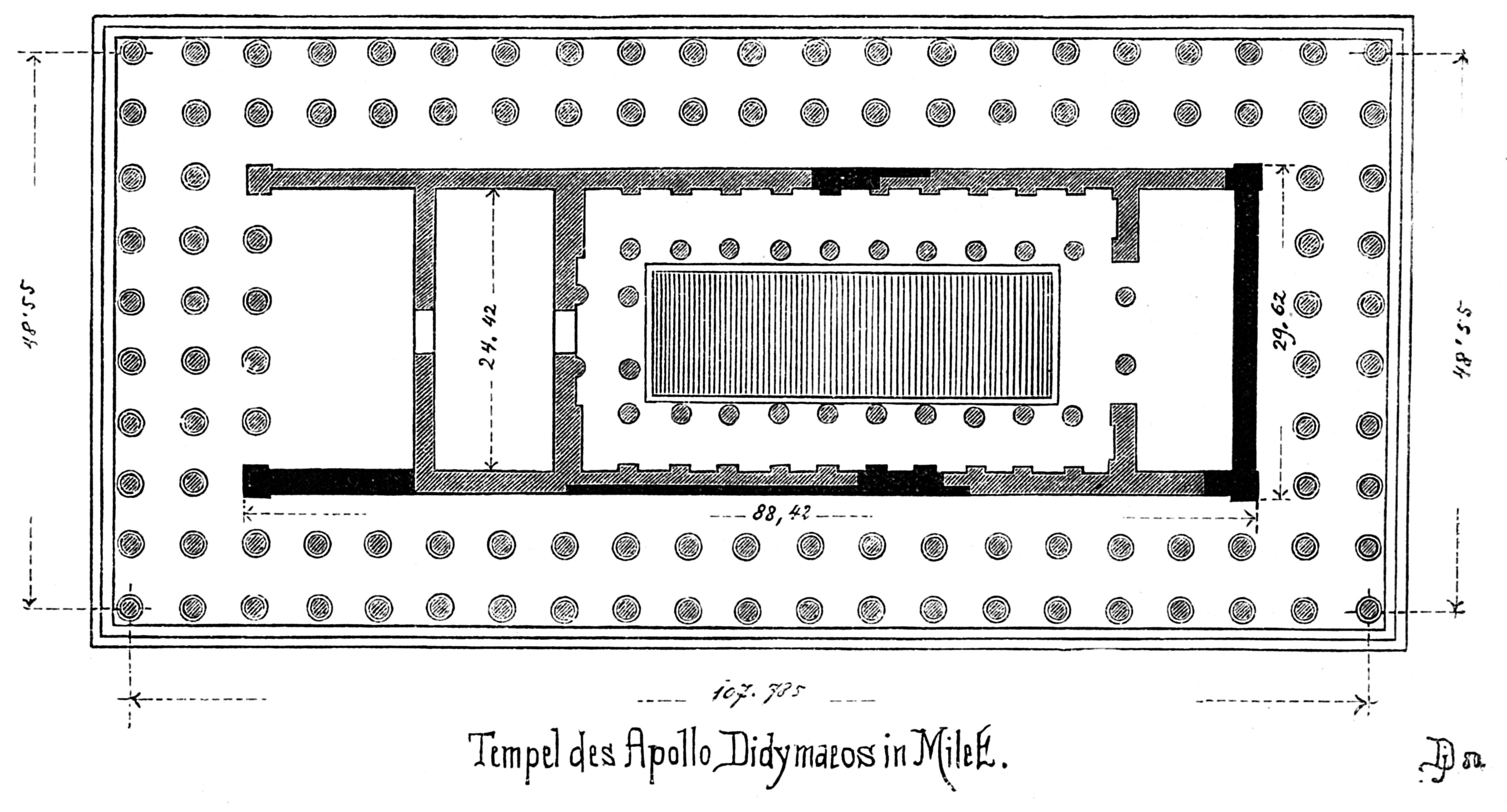 * Didyma (near Miletus): The gigantic Ionic temple of ''Apollo Didymaios'' started around 540 B.C. The construction ceased and then it was restarted in 330 B.C. The temple is dipteral, with an outer row of 10 x 21 columns, and it measures 28.90 x 80.75 m at the stylobate.
*
* Didyma (near Miletus): The gigantic Ionic temple of ''Apollo Didymaios'' started around 540 B.C. The construction ceased and then it was restarted in 330 B.C. The temple is dipteral, with an outer row of 10 x 21 columns, and it measures 28.90 x 80.75 m at the stylobate.
*Etruscan and Roman temples
* Veii ( Etruria): The temple of Apollo was built in the late 6th century B.C. and it indicates the spread of Apollo's culture (Aplu) in Etruria. There was a prostyle porch, which is called Tuscan, and a triple cella 18,50 m wide.Robertson pp. 200-201 *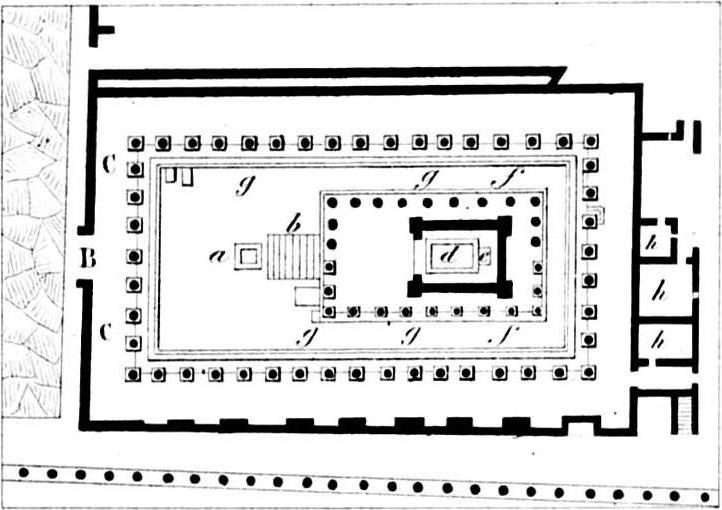 * Pompeii (Italy): The cult of Apollo was widespread in the region of Campania since the 6th century B.C. The temple was built in 120 B.C., but its beginnings lie in the 6th century B.C. It was reconstructed after an earthquake in A.D. 63. It demonstrates a mixing of styles which formed the basis of Roman architecture. The columns in front of the cella formed a Tuscan prostyle porch, and the cella is situated unusually far back. The peripteral colonnade of 48 Ionic columns was placed in such a way that the emphasis was given to the front side.
* Rome: The temple of Apollo Sosianus and the ''temple of Apollo Medicus''. The first temple building dates to 431 B.C., and was dedicated to Apollo Medicus (the doctor), after a plague of 433 B.C. It was rebuilt by
* Pompeii (Italy): The cult of Apollo was widespread in the region of Campania since the 6th century B.C. The temple was built in 120 B.C., but its beginnings lie in the 6th century B.C. It was reconstructed after an earthquake in A.D. 63. It demonstrates a mixing of styles which formed the basis of Roman architecture. The columns in front of the cella formed a Tuscan prostyle porch, and the cella is situated unusually far back. The peripteral colonnade of 48 Ionic columns was placed in such a way that the emphasis was given to the front side.
* Rome: The temple of Apollo Sosianus and the ''temple of Apollo Medicus''. The first temple building dates to 431 B.C., and was dedicated to Apollo Medicus (the doctor), after a plague of 433 B.C. It was rebuilt by Mythology
Apollo appears often in the myths, plays and hymns. As Zeus' favorite son, Apollo had direct access to the mind of Zeus and was willing to reveal this knowledge to humans. A divinity beyond human comprehension, he appears both as a beneficial and a wrathful god.Birth

 Apollo was the son of Zeus, the king of the gods, and Leto, his previous wife or one of his mistresses. Growing up, Apollo was nursed by the nymphs Korythalia and
Apollo was the son of Zeus, the king of the gods, and Leto, his previous wife or one of his mistresses. Growing up, Apollo was nursed by the nymphs Korythalia and Hyperborea
Hyperborea, the mystical land of eternal spring, venerated Apollo above all the gods. The Hyperboreans always sang and danced in his honor and hosted Pythian games. There, a vast forest of beautiful trees was called "the garden of Apollo". Apollo spent the winter months among the Hyperboreans. His absence from the world caused coldness and this was marked as his annual death. No prophecies were issued during this time.Joseph Eddy Fontenrose, ''Python: A Study of Delphic Myth and Its Origins'' He returned to the world during the beginning of the spring. The ''Theophania'' festival was held in Delphi to celebrate his return. It is said that Leto came to Delos from Hyperborea accompanied by a pack of wolves. Henceforth, Hyperborea became Apollo's winter home and wolves became sacred to him. His intimate connection to wolves is evident from his epithet ''Lyceus'', meaning ''wolf-like''. But Apollo was also the wolf-slayer in his role as the god who protected flocks from predators. The Hyperborean worship of Apollo bears the strongest marks of Apollo being worshipped as the sun god. Shamanistic elements in Apollo's cult are often liked to his Hyperborean origin, and he is likewise speculated to have originated as a solar shaman. Shamans likeChildhood and youth
As a child, Apollo is said to have built a foundation and an altar on Delos using the horns of the goats that his sister Artemis hunted. Since he learnt the art of building when young, he later came to be known as Archegetes, ''the founder (of towns)'' and god who guided men to build new cities. From his father Zeus, Apollo had also received a golden chariot drawn by swans. In his early years when Apollo spent his time herding cows, he was reared byPython
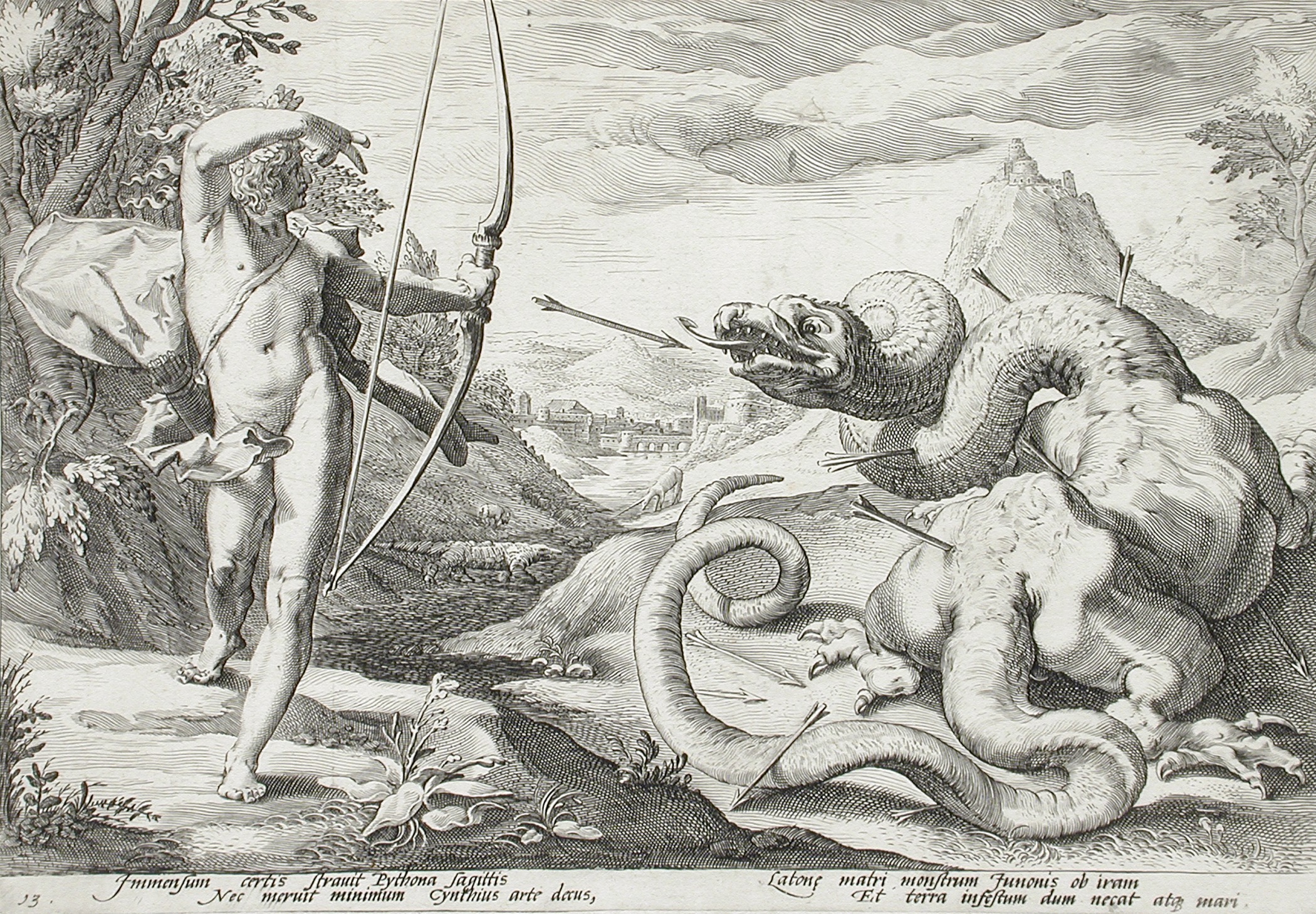 However, Apollo had committed a blood murder and had to be purified. Because Python was a child of
However, Apollo had committed a blood murder and had to be purified. Because Python was a child of Tityos
 Hera once again sent another giant,
Hera once again sent another giant, Admetus
1.9.15
Hyginus, '' Fabulae'
50-51
by taming a lion and a boar to draw Admetus' chariot. He was present during their wedding to give his blessings. When Admetus angered the goddess Artemis by forgetting to give her the due offerings, Apollo came to the rescue and calmed his sister. When Apollo learnt of Admetus' untimely death, he convinced or tricked the
3.10.4
Apollo would have been banished to
Niobe
The fate of Niobe was prophesied by Apollo while he was still in Leto's womb. Niobe was the queen of Thebes and wife ofBuilding the walls of Troy
 Once Apollo and Poseidon served under the Trojan king Laomedon in accordance to Zeus' words. Apollodorus states that the gods willingly went to the king disguised as humans in order to check his hubris. Apollo guarded the cattle of Laomedon in the valleys of mount Ida, while Poseidon built the walls of Troy. Other versions make both Apollo and Poseidon the builders of the wall. In Ovid's account, Apollo completes his task by playing his tunes on his lyre.
In
Once Apollo and Poseidon served under the Trojan king Laomedon in accordance to Zeus' words. Apollodorus states that the gods willingly went to the king disguised as humans in order to check his hubris. Apollo guarded the cattle of Laomedon in the valleys of mount Ida, while Poseidon built the walls of Troy. Other versions make both Apollo and Poseidon the builders of the wall. In Ovid's account, Apollo completes his task by playing his tunes on his lyre.
In Trojan War
Apollo sided with the Trojans during the Trojan War waged by the Greeks against the Trojans. During the war, the Greek king The Trojan hero Hector (who, according to some, was the god's own son by
The Trojan hero Hector (who, according to some, was the god's own son by Heracles
After Heracles (then named Alcides) was struck with madness and killed his family, he sought to purify himself and consulted the oracle of Apollo. Apollo, through the Pythia, commanded him to serve king To complete his third task, Heracles had to capture the
To complete his third task, Heracles had to capture the Periphas
Plato's concept of soulmates
A long time ago, there were three kinds of human beings: male, descended from the sun; female, descended from the earth; and androgynous, descended from the moon. Each human being was completely round, with four arms and fours legs, two identical faces on opposite sides of a head with four ears, and all else to match. They were powerful and unruly.Nurturer of the young
Apollo ''Kourotrophos'' is the god who nurtures and protects children and the young, especially boys. He oversees their education and their passage into adulthood. Education is said to have originated from Apollo and the Muses. Many myths have him train his children. It was a custom for boys to cut and dedicate their long hair to Apollo after reaching adulthood.God of music
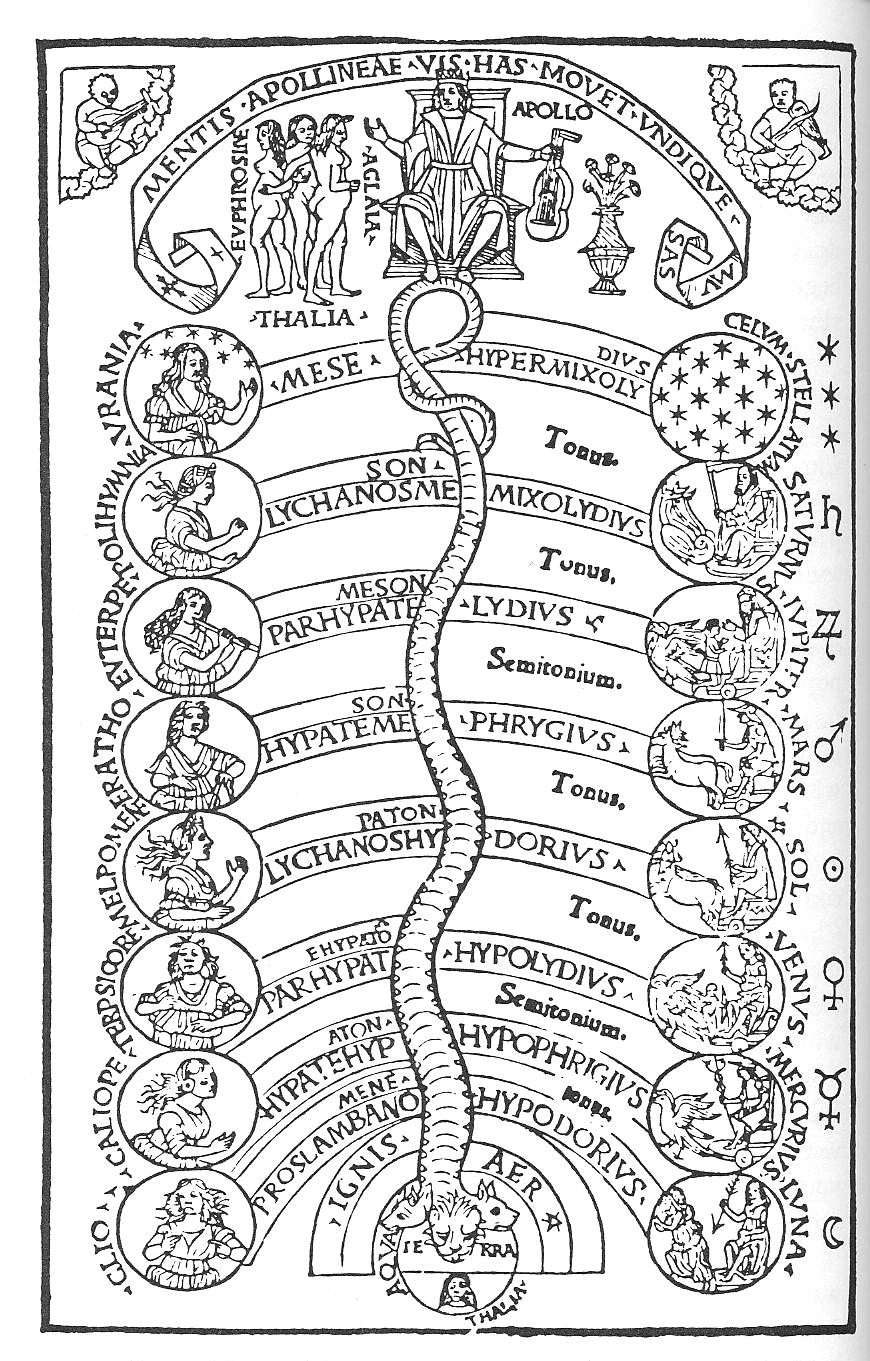 Immediately after his birth, Apollo demanded a lyre and invented the paean, thus becoming the god of music. As the divine singer, he is the patron of poets, singers and musicians. The invention of string music is attributed to him. Plato said that the innate ability of humans to take delight in music, rhythm and harmony is the gift of Apollo and the Muses. According to Socrates, ancient Greeks believed that Apollo is the god who directs the harmony and makes all things move together, both for the gods and the humans. For this reason, he was called ''Homopolon'' before the ''Homo'' was replaced by ''A''. Apollo's harmonious music delivered people from their pain, and hence, like Dionysus, he is also called the liberator. The swans, which were considered to be the most musical among the birds, were believed to be the "singers of Apollo". They are Apollo's sacred birds and acted as his vehicle during his travel to Hyperborea. Aelian says that when the singers would sing hymns to Apollo, the swans would join the chant in unison.
Immediately after his birth, Apollo demanded a lyre and invented the paean, thus becoming the god of music. As the divine singer, he is the patron of poets, singers and musicians. The invention of string music is attributed to him. Plato said that the innate ability of humans to take delight in music, rhythm and harmony is the gift of Apollo and the Muses. According to Socrates, ancient Greeks believed that Apollo is the god who directs the harmony and makes all things move together, both for the gods and the humans. For this reason, he was called ''Homopolon'' before the ''Homo'' was replaced by ''A''. Apollo's harmonious music delivered people from their pain, and hence, like Dionysus, he is also called the liberator. The swans, which were considered to be the most musical among the birds, were believed to be the "singers of Apollo". They are Apollo's sacred birds and acted as his vehicle during his travel to Hyperborea. Aelian says that when the singers would sing hymns to Apollo, the swans would join the chant in unison.
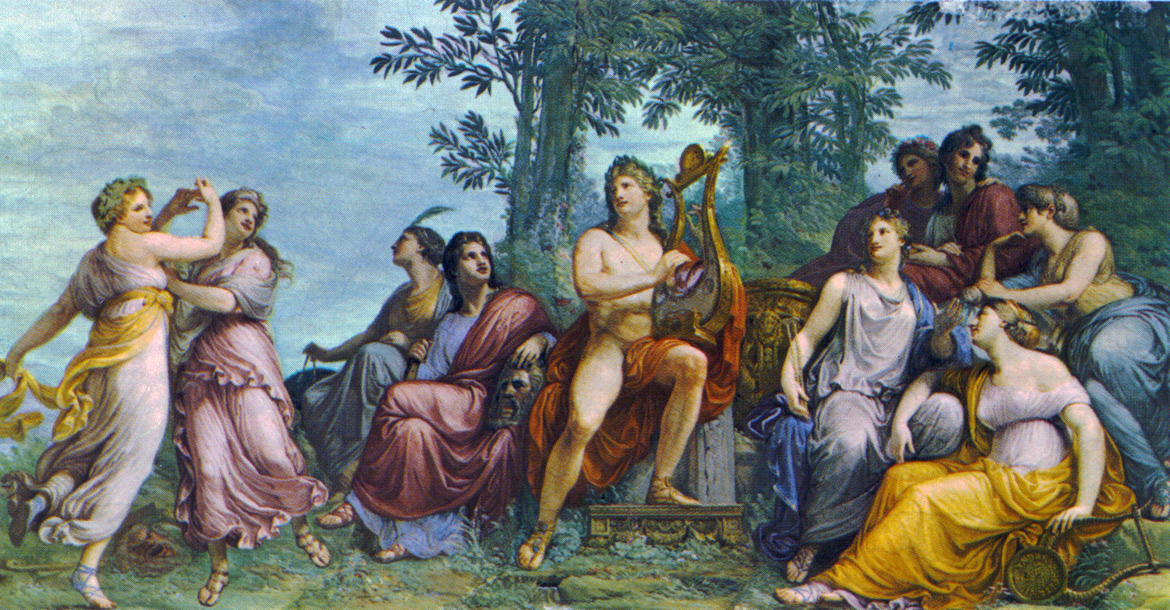 Among the Pythagoreans, the study of mathematics and music were connected to the worship of Apollo, their principal deity. Their belief was that the music purifies the soul, just as medicine purifies the body. They also believed that music was delegated to the same mathematical laws of harmony as the mechanics of the cosmos, evolving into an idea known as the music of the spheres.
Apollo appears as the companion of the Muses, and as Musagetes ("leader of Muses") he leads them in dance. They spend their time on Parnassus, which is one of their sacred places. Apollo is also the lover of the Muses and by them he became the father of famous musicians like Orpheus and
Among the Pythagoreans, the study of mathematics and music were connected to the worship of Apollo, their principal deity. Their belief was that the music purifies the soul, just as medicine purifies the body. They also believed that music was delegated to the same mathematical laws of harmony as the mechanics of the cosmos, evolving into an idea known as the music of the spheres.
Apollo appears as the companion of the Muses, and as Musagetes ("leader of Muses") he leads them in dance. They spend their time on Parnassus, which is one of their sacred places. Apollo is also the lover of the Muses and by them he became the father of famous musicians like Orpheus and Apollo's lyre
The invention of lyre is attributed either to Upon discovering the theft, Apollo confronted Hermes and asked him to return his cattle. When Hermes acted innocent, Apollo took the matter to Zeus. Zeus, having seen the events, sided with Apollo, and ordered Hermes to return the cattle. Hermes then began to play music on the lyre he had invented. Apollo fell in love with the instrument and offered to exchange the cattle for the lyre. Hence, Apollo then became the master of the lyre.
According to other versions, Apollo had invented the lyre himself, whose strings he tore in repenting of the excess punishment he had given to Marsyas. Hermes' lyre, therefore, would be a reinvention.
Upon discovering the theft, Apollo confronted Hermes and asked him to return his cattle. When Hermes acted innocent, Apollo took the matter to Zeus. Zeus, having seen the events, sided with Apollo, and ordered Hermes to return the cattle. Hermes then began to play music on the lyre he had invented. Apollo fell in love with the instrument and offered to exchange the cattle for the lyre. Hence, Apollo then became the master of the lyre.
According to other versions, Apollo had invented the lyre himself, whose strings he tore in repenting of the excess punishment he had given to Marsyas. Hermes' lyre, therefore, would be a reinvention.
Contest with Pan
 Once Pan had the audacity to compare his music with that of Apollo and to challenge the god of music to a contest. The mountain-god Tmolus was chosen to umpire. Pan blew on his pipes, and with his rustic melody gave great satisfaction to himself and his faithful follower, Midas, who happened to be present. Then, Apollo struck the strings of his lyre. It was so beautiful that Tmolus at once awarded the victory to Apollo, and everyone was pleased with the judgement. Only Midas dissented and questioned the justice of the award. Apollo did not want to suffer such a depraved pair of ears any longer, and caused them to become the ears of a donkey.
Once Pan had the audacity to compare his music with that of Apollo and to challenge the god of music to a contest. The mountain-god Tmolus was chosen to umpire. Pan blew on his pipes, and with his rustic melody gave great satisfaction to himself and his faithful follower, Midas, who happened to be present. Then, Apollo struck the strings of his lyre. It was so beautiful that Tmolus at once awarded the victory to Apollo, and everyone was pleased with the judgement. Only Midas dissented and questioned the justice of the award. Apollo did not want to suffer such a depraved pair of ears any longer, and caused them to become the ears of a donkey.
Contest with Marsyas
Marsyas was a According to one account, after the first round, they both were deemed equal by the
According to one account, after the first round, they both were deemed equal by the  According to another account, Marsyas played his flute out of tune at one point and accepted his defeat. Out of shame, he assigned to himself the punishment of being skinned for a wine sack. Another variation is that Apollo played his instrument upside down. Marsyas could not do this with his instrument. So the Muses who were the judges declared Apollo the winner. Apollo hung Marsyas from a tree to flay him.
Apollo
According to another account, Marsyas played his flute out of tune at one point and accepted his defeat. Out of shame, he assigned to himself the punishment of being skinned for a wine sack. Another variation is that Apollo played his instrument upside down. Marsyas could not do this with his instrument. So the Muses who were the judges declared Apollo the winner. Apollo hung Marsyas from a tree to flay him.
Apollo Contest with Cinyras
Cinyras was a ruler of Cyprus, who was a friend of
Patron of sailors
Apollo functions as the patron and protector of sailors, one of the duties he shares with Poseidon. In the myths, he is seen helping heroes who pray to him for safe journey. When Apollo spotted a ship of Cretan sailors that was caught in a storm, he quickly assumed the shape of a dolphin and guided their ship safely to Delphi. When theWars
Titanomachy
Once Hera, out of spite, aroused the Titans to war against Zeus and take away his throne. Accordingly, when the Titans tried to climb Mount Olympus, Zeus with the help of Apollo,Trojan War
Apollo played a pivotal role in the entire Trojan War. He sided with the Trojans, and sent a terrible plague to the Greek camp, which indirectly led to the conflict between Achilles and
Telegony war
A war broke out between theIndian war
When Zeus suggested that Dionysus defeat the Indians in order to earn a place among the gods, Dionysus declared war against the Indians and travelled to India along with his army ofTheban war
During the war between the sons of Oedipus, Apollo favoredSlaying of giants
Apollo killed the giants Python and Tityos, who had assaulted his mother Leto.Gigantomachy
During the gigantomachy, Apollo and Heracles blinded the giant Ephialtes by shooting him in his eyes, Apollo shooting his left and Heracles his right. He also killedAloadae
ThePhorbas
Other stories
 In the first Olympic games, Apollo defeated
In the first Olympic games, Apollo defeated Molpadia and Parthenos
Molpadia and Parthenos were the sisters ofPrometheus
Prometheus was the titan who was punished by Zeus for stealing fire. He was bound to a rock, where each day an eagle was sent to eat Prometheus' liver, which would then grow back overnight to be eaten again the next day. Seeing his plight, Apollo pleaded Zeus to release the kind Titan, while Artemis and Leto stood behind him with tears in their eyes. Zeus, moved by Apollo's words and the tears of the goddesses, finally sent Heracles to free Prometheus.
The rock of Leukas
Leukatas was believed to be a white colored rock jutting out from the island of10.2.8
Once, Aphrodite fell deeply in love with

Female lovers
Love affairs ascribed to Apollo are a late development in Greek mythology. Their vivid anecdotal qualities have made some of them favorites of painters since the Renaissance, the result being that they stand out more prominently in the modern imagination. Daphne was a
Daphne was a  Apollo is said to have been the lover of all nine Muses, and not being able to choose one of them, decided to remain unwed. He fathered the
Apollo is said to have been the lover of all nine Muses, and not being able to choose one of them, decided to remain unwed. He fathered the Male lovers



4.5
During his exile, which lasted either for one year or nine years, Apollo served Admetus as a herdsman. The romantic nature of their relationship was first described by
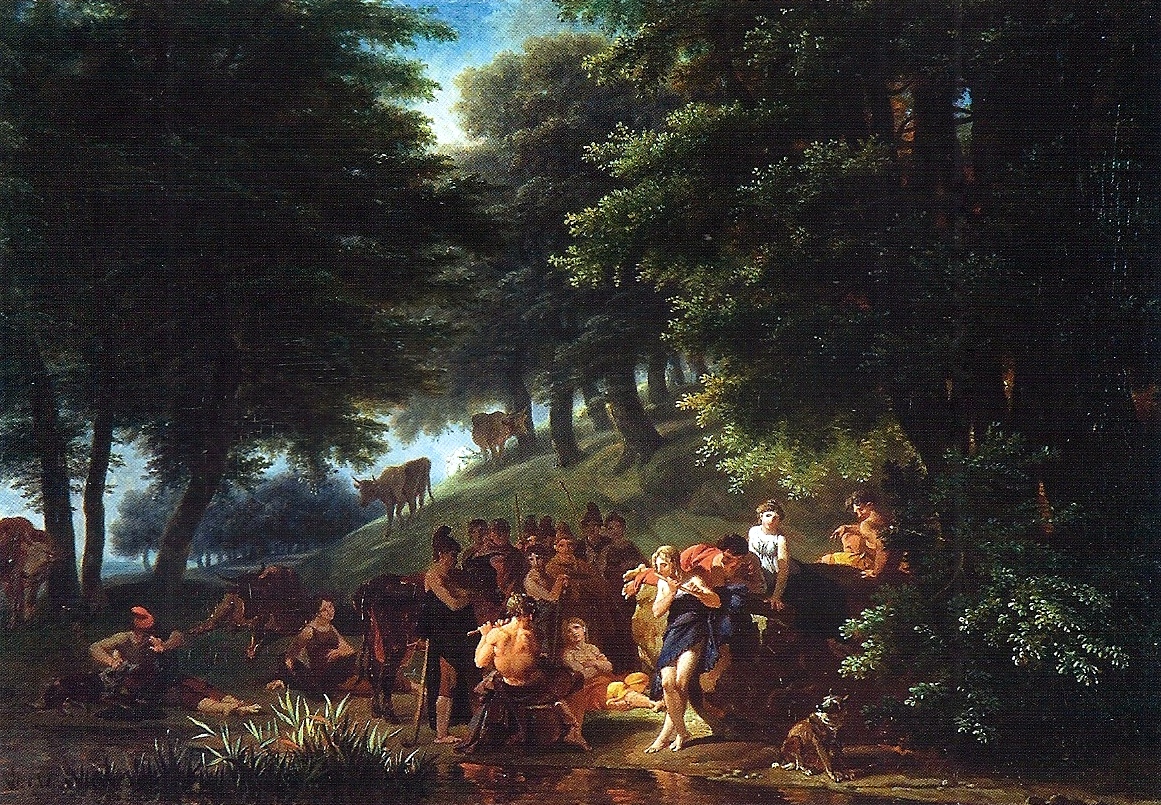 When Admetus wanted to marry princess
When Admetus wanted to marry princess 23
_ _Hesiod,_''Megalai_Ehoiai">Hesiod.html"_;"title="_Hesiod">_Hesiod,_''Megalai_Ehoiai''_fr._16.html" ;"title="Hesiod,_''Megalai_Ehoiai.html" ;"title="Hesiod.html" ;"title=" Hesiod"> Hesiod, ''Megalai Ehoiai">Hesiod.html" ;"title=" Hesiod"> Hesiod, ''Megalai Ehoiai'' fr. 16">Hesiod,_''Megalai_Ehoiai.html" ;"title="Hesiod.html" ;"title=" Hesiod"> Hesiod, ''Megalai Ehoiai">Hesiod.html" ;"title=" Hesiod"> Hesiod, ''Megalai Ehoiai'' fr. 16 Smith 1873
s.v. Hymen
Grimal, s.v. Hymenaeus. *Iapis, to whom Apollo taught the art of healing *Phorbas of Thessaly, Phorbas, the dragon slayer (probably the son of Triopas) Plutarch, ''Numa'
4.5
cf. Hyginus, ''
2.14
Children
Apollo sired many children, from mortal women and nymphs as well as the goddesses. His children grew up to be physicians, musicians, poets, seers or archers. Many of his sons founded new cities and became kings. They were all usually very beautiful.Failed love attempts
Female counterparts

Artemis
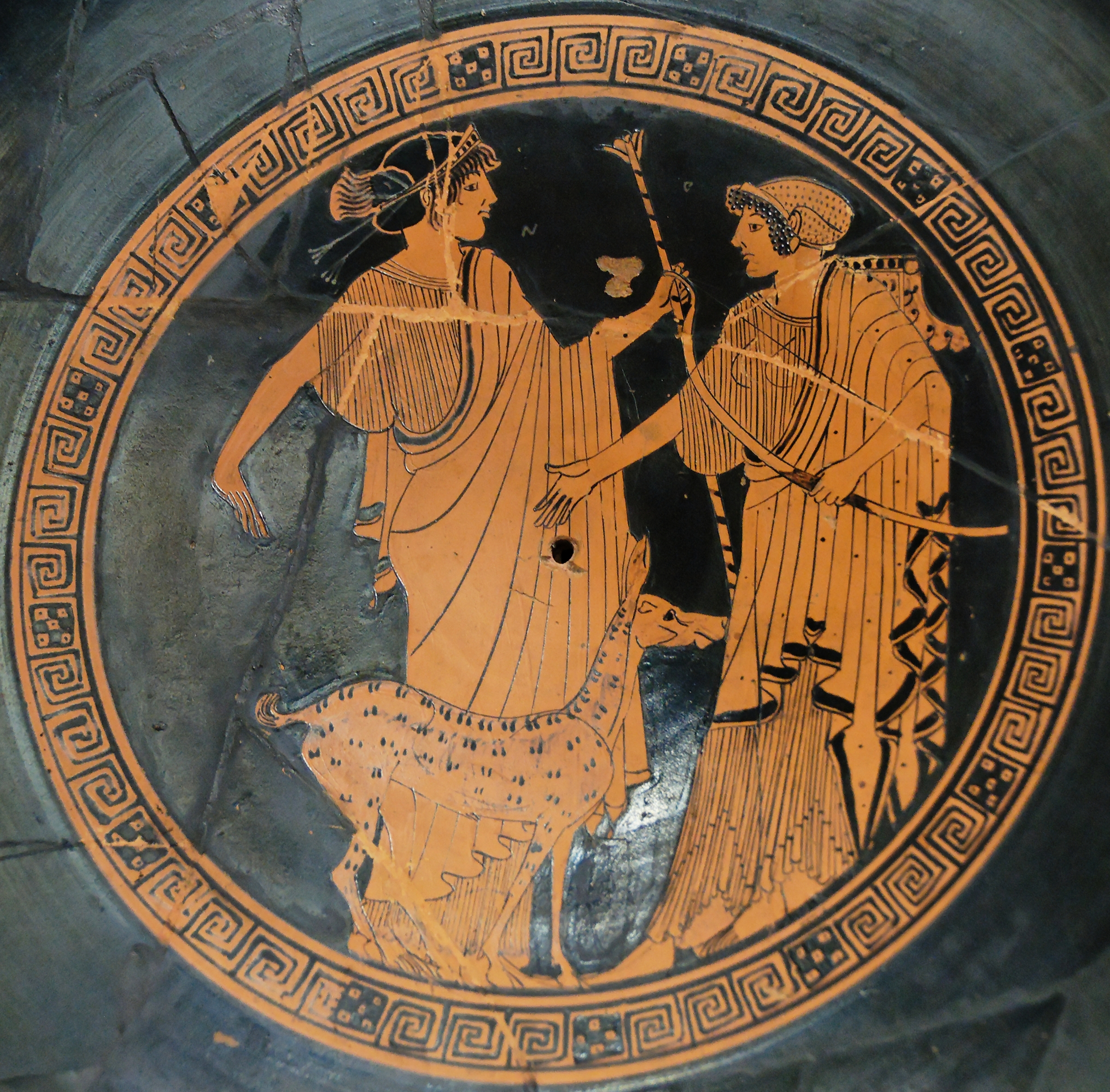 Artemis as the sister of Apollo, is ''thea apollousa'', that is, she as a female divinity represented the same idea that Apollo did as a male divinity. In the pre-Hellenic period, their relationship was described as the one between husband and wife, and there seems to have been a tradition which actually described Artemis as the wife of Apollo. However, this relationship was never sexual but spiritual, which is why they both are seen being unmarried in the
Artemis as the sister of Apollo, is ''thea apollousa'', that is, she as a female divinity represented the same idea that Apollo did as a male divinity. In the pre-Hellenic period, their relationship was described as the one between husband and wife, and there seems to have been a tradition which actually described Artemis as the wife of Apollo. However, this relationship was never sexual but spiritual, which is why they both are seen being unmarried in the Hecate

Athena
As a deity of knowledge and great power, Apollo was seen being the male counterpart ofApollo in the ''Oresteia''
InRoman Apollo
The Roman worship of Apollo was adopted from the Greeks. As a quintessentiallyFestivals
The chief Apollonian festival was the Pythian Games held every four years at Delphi and was one of the four great Panhellenic Games. Also of major importance was theAttributes and symbols
Apollo's most common attributes were the bow and The palm tree was also sacred to Apollo because he had been born under one in Delos. Animals sacred to Apollo included wolves, dolphins, roe deer, swans,
The palm tree was also sacred to Apollo because he had been born under one in Delos. Animals sacred to Apollo included wolves, dolphins, roe deer, swans, /ref> In many myths Apollo is transformed into a hawk. In addition,
/ref>
 As god of colonization, Apollo gave oracular guidance on colonies, especially during the height of colonization, 750–550 BCE. According to Greek tradition, he helped
As god of colonization, Apollo gave oracular guidance on colonies, especially during the height of colonization, 750–550 BCE. According to Greek tradition, he helped Apollo in the arts
Apollo is a common theme in Greek and Roman art and also in the art of the Renaissance. The earliest Greek word for a statue is "delight" (, ''agalma''), and the sculptors tried to create forms which would inspire such guiding vision. Greek art puts into Apollo the highest degree of power and beauty that can be imagined. The sculptors derived this from observations on human beings, but they also embodied in concrete form, issues beyond the reach of ordinary thought. The naked bodies of the statues are associated with the cult of the body that was essentially a religious activity. The muscular frames and limbs combined with slim waists indicate the Greek desire for health, and the physical capacity which was necessary in the hard Greek environment. The statues of Apollo embody beauty, balance and inspire awe before the beauty of the world.Archaic sculpture
Numerous free-standing statues of male youths fromClassical sculpture

 The famous
The famous Hellenistic Greece-Rome
Apollo as a handsome beardless young man, is often depicted with a cithara (as Apollo Citharoedus) or bow in his hand, or reclining on a tree (theModern reception
Apollo often appears inPostclassical art and literature
Dance and music
Apollo has featured in dance and music in modern culture. Percy Bysshe Shelley composed a "Hymn of Apollo" (1820), and the god's instruction of the Muses formed the subject of Igor Stravinsky's ''Books
Apollo been portrayed in modern literature, such as when
Film
Apollo has been depicted in modern films—for instance, by Keith David in the 1997 animated feature film ''Video games
Apollo has appeared in many modern video games. Apollo appears as a minor character in Santa Monica Studio's 2010Spaceflight
In spaceflight, the 1960s and 1970s NASA program for orbiting and landing astronauts on the Moon was named afterNASA.gov. Retrieved September 17, 2009. (September 15, 1908June 1, 2001) was an American engine ...
Genealogy
See also
*Notes
References
Sources
Primary sources
* Aelian, ''On Animals'', Volume II: Books 6–11. Translated by A. F. Scholfield. Loeb Classical Library 447. Cambridge, MA: Harvard University Press, 1958. *Online version at the Perseus Digital Library
*
Online version at the Topos Text Project.
*
Online version at the Perseus Digital Library
*
Internet Archive
*
Online version at Harvard University Press
* Cicero, Marcus Tullius, ''
Internet Archive
* Diodorus Siculus, ''Library of History, Volume III: Books 4.59-8'', translated by C. H. Oldfather, Loeb Classical Library No. 340. Cambridge, Massachusetts, Harvard University Press, 1939.
Online version at Harvard University Press
* Herodotus, ''Herodotus, with an English translation by A. D. Godley.'' Cambridge. Harvard University Press. 1920
Online version available at The Perseus Digital Library
* Hesiod, '' Theogony'', in ''The Homeric Hymns and Homerica with an English Translation by Hugh G. Evelyn-White'', Cambridge, MA., Harvard University Press; London, William Heinemann Ltd. 1914
Online version at the Perseus Digital Library
* '' Homeric Hymn 3 to Apollo'' in ''The Homeric Hymns and Homerica with an English Translation by Hugh G. Evelyn-White'', Cambridge, MA., Harvard University Press; London, William Heinemann Ltd. 1914
Online version at the Perseus Digital Library
* '' Homeric Hymn'' 4 ''to Hermes'', in ''The Homeric Hymns and Homerica with an English Translation by Hugh G. Evelyn-White'', Cambridge, Massachusetts, Harvard University Press; London, William Heinemann Ltd. 1914
Online version at the Perseus Digital Library
* Homer, ''The Iliad with an English Translation by A.T. Murray, PhD in two volumes''. Cambridge, MA., Harvard University Press; London, William Heinemann, Ltd. 1924
Online version at the Perseus Digital Library
* Homer; ''The Odyssey with an English Translation by A.T. Murray, PH.D. in two volumes''. Cambridge, MA., Harvard University Press; London, William Heinemann, Ltd. 1919
Online version at the Perseus Digital Library
* Hyginus, Gaius Julius, ''
Online version at ToposText
* Hyginus, Gaius Julius, '' Fabulae'', in ''The Myths of Hyginus'', edited and translated by Mary A. Grant, Lawrence: University of Kansas Press, 1960
Online version at ToposText
* Livy, ''The History of Rome, Books I and II With An English Translation''. Cambridge. Cambridge, Mass., Harvard University Press; London, William Heinemann, Ltd. 1919. *
Internet Archive
*
Internet Archive
*
Online version at the Perseus Digital Library.
*
Online version at the Perseus Digital Library
10. 162–219 (1–8 CE) *
Online version at the Perseus Digital Library
*
Online version at Harvard University Press
Internet Archive 1926 edition
i.24 Hyacinthus (170–245 CE) *
Online version at Harvard University Press
14. Hyacinthus (170–245 CE) *
Online version at the Perseus Digital Library
* Plutarch. ''Lives, Volume I: Theseus and Romulus. Lycurgus and Numa. Solon and Publicola.'' Translated by Bernadotte Perrin. Loeb Classical Library No. 46. Cambridge, Massachusetts: Harvard University Press, 1914.
Online version at Harvard University Press
*
Online version at the Perseus Digital Library
* Lucian, ''Dialogues of the Dead. Dialogues of the Sea-Gods. Dialogues of the Gods. Dialogues of the Courtesans'', translated by M. D. MacLeod, Loeb Classical Library No. 431, Cambridge, Massachusetts, Harvard University Press, 1961.
Online version at Harvard University Press
*
Google Books
(English translation: Book I by Ana Untila; Books II–IV, by Gary Berkowitz; Books V–VI by Konstantino Ramiotis; Books VII–VIII by Vasiliki Dogani; Books IX–X by Jonathan Alexander; Books XII–XIII by Nikolaos Giallousis
Internet Archive
. * Valerius Flaccus, ''Argonautica'', translated by J. H. Mozley, Loeb Classical Library No. 286. Cambridge, Massachusetts, Harvard University Press; London, William Heinemann Ltd. 1928.
Online version at Harvard University Press
* Vergil, ''
Online version at the Perseus Digital Library.
Secondary sources
* Athanassakis, Apostolos N., and Benjamin M. Wolkow, ''The Orphic Hymns'', Johns Hopkins University Press; owlerirst Printing edition (May 29, 2013).Google Books
* M. Bieber, 1964. ''Alexander the Great in Greek and Roman Art''. Chicago. * Hugh Bowden, 2005. ''Classical Athens and the Delphic Oracle: Divination and Democracy''. Cambridge University Press. * Walter Burkert, 1985.
Greek Religion
' (Harvard University Press) III.2.5 ''passim'' * * Fontenrose, Joseph Eddy, ''Python: A Study of Delphic Myth and Its Origins'', University of California Press, 1959. . * Gantz, Timothy, ''Early Greek Myth: A Guide to Literary and Artistic Sources'', Johns Hopkins University Press, 1996, Two volumes: (Vol. 1), (Vol. 2). * * Miranda J. Green, 1997. ''Dictionary of Celtic Myth and Legend'', Thames and Hudson. * Grimal, Pierre, ''The Dictionary of Classical Mythology'', Wiley-Blackwell, 1996. . * Hard, Robin, ''The Routledge Handbook of Greek Mythology: Based on H.J. Rose's "Handbook of Greek Mythology"'', Psychology Press, 2004,
Google Books
* Karl Kerenyi, 1953. ''Apollon: Studien über Antiken Religion und Humanität'' revised edition. * Kerényi, Karl 1951, ''The Gods of the Greeks'', Thames and Hudson, London. * Mertens, Dieter; Schutzenberger, Margareta. ''Città e monumenti dei Greci d'Occidente: dalla colonizzazione alla crisi di fine V secolo a.C.''. Roma L'Erma di Bretschneider, 2006. . * Martin Nilsson, 1955. ''Die Geschichte der Griechische Religion'', vol. I. C.H. Beck. * Parada, Carlos, ''Genealogical Guide to Greek Mythology'', Jonsered, Paul Åströms Förlag, 1993. . * Pauly–Wissowa, ''Realencyclopädie der klassischen Altertumswissenschaft'': II, "Apollon". The best repertory of cult sites (Burkert). * Peck, Harry Thurston, '' Harpers Dictionary of Classical Antiquities'', New York. Harper and Brothers. 1898
Online version at the Perseus Digital Library
* Pfeiff, K.A., 1943. ''Apollon: Wandlung seines Bildes in der griechischen Kunst''. Traces the changing iconography of Apollo. * D.S.Robertson (1945) ''A handbook of Greek and Roman Architecture'' Cambridge University Press * Smith, William; '' Dictionary of Greek and Roman Biography and Mythology'', London (1873)
"Apollo"
* * Smith, William, ''
Online version at the Perseus Digital Library
* Spivey Nigel (1997) ''Greek art'' Phaedon Press Ltd.
External links
at the Greek Mythology Link, by Carlos Parada
The Warburg Institute Iconographic Database: ca 1650 images of Apollo
{{Authority control Greek gods Roman gods Beauty gods Health gods Knowledge gods Light gods Maintenance deities Music and singing gods Oracular gods Solar gods Plague gods Dragonslayers Mythological Greek archers Mythological rapists Homosexuality and bisexuality deities Divine twins Deities in the Iliad Metamorphoses characters Musicians in Greek mythology Characters in Greek mythology LGBT themes in Greek mythology Children of Zeus Characters in the Odyssey Characters in the Argonautica Characters in Roman mythology Childhood gods Mythological Greek physicians Arts gods Dii Consentes Medicine deities Mercurian deities Twelve Olympians Dance gods Kourotrophoi Shapeshifters in Greek mythology Prophecy